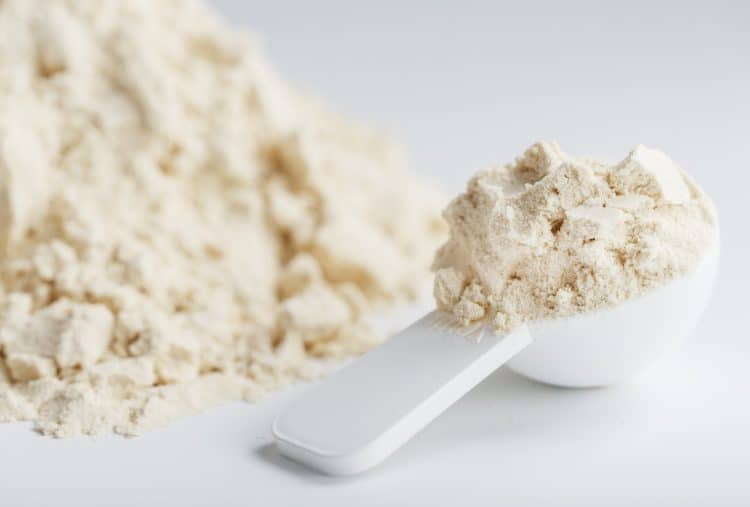Collagen is a form of protein that most people associate with skin and joint health. However, it has become popular as a weight loss supplement over the past few years. Yet, collagen’s ability to help you shed pounds is far from settled science. In this article, we delve into the research to help you decide whether supplementing with collagen will help you achieve your fat loss goals.
What is Collagen?

Collagen is the most abundant form of protein in your body. It helps support the structure of your skin, hair, nails, and connective tissue. It is also needed for bone health, promoting both density and strength. As we age, our body’s ability to produce collagen decreases. This results in many common signs of aging, such as wrinkles, lack of skin elasticity, and joint stiffness.
Other benefits of collagen include promoting the structure and function of muscle tissue. It promotes muscle strength and helps improve post-workout recovery. Specific amino acids that makeup collagen help promote gut health and improve digestion.
Collagen also helps improve cardiovascular health. It strengthens blood vessels, helps reduce blood pressure, and may lower the risk of heart disease.
Collagen comprises 19 amino acids, structured in a triple helix construction. Three amino acids make up nearly 60% of collagen:
- Glycine
- Proline
- Hydroxyproline
Learn more about collagen and its ability to help you build lean muscle mass.
Collagen Supplement Forms
There are four forms of collagen that you will find in collagen supplements:
Type I Collagen
The majority of the collagen in your body is Type 1. It is present in the skin, tendons, and connective tissue. This form of collagen is best for skin, nail, and hair health.
Type II Collagen
Most of the collagen in your cartilage is Type II. It is the best form of the supplement to promote joint health and help reduce the symptoms of osteoarthritis.
Type III Collagen
Type III collagen works with Type I to promote skin elasticity and prevent wrinkles, though it is far less abundant. This type of collagen supplements have the same skin-enhancing benefits as Type I.
Multi-Collagen Blend
Multi-blend supplements include a combination of all three forms of collagen. This multi-faceted approach benefits your skin, hair, nails, joints, and connective tissue and promotes blood vessel and organ health.
Types of Collagen Supplements

Collagen supplements are sold in several formats, each offering unique benefits:
Collagen Hydrolysate
You may be familiar with whey hydrolysate, which breaks down protein molecules for faster absorption into the body. Collagen hydrolysate does the same thing. Before you put it into your body, it has been predigested into collagen peptides, saving the body from carrying out this step. This allows the collagen to get into your cells faster. The trade-off is that there is a smaller thermic effect because the body has to do less work to digest the collagen.
Liquid Collagen
Liquid collagen is actually a powdered form of the protein suspended in a liquid. It may be flavored or combined with another supplement. This is the most expensive form of collagen supplement.
Powdered Collagen
A powdered collagen supplement comes in a container with a scoop and must be mixed with water or some other liquid. It can be harder to get a standard dosage and may turn into a clumpy, gritty drink if the powder doesn’t mix properly.
Capsule Collagen
It is a powdered form of the supplement put into a capsule. This ensures you get a standard dose. Make sure that the material used in the capsule is healthy. If you are a vegan or vegetarian, you will want to avoid gelatin capsules which are made from bovine or porcine sources.
Does Collagen Assist with Weight Loss?
There is some research indicating that collagen may assist in weight loss. However, the effect is not significant, so it would be a mistake to classify collagen as a major weight loss stimulator. The other benefits of taking collagen far outweigh its weight loss potential.

Let’s delve into the research to discover how collagen may help promote weight loss.
A couple of studies focused on the use of specific collagen derived from a flat fish known as the ‘skate fish.’ In a 2019 study by Tak, et al., researchers gave 81 overweight adults either 2,000 mg of skatefish collagen in supplementary form or a placebo for 12 weeks. At the end of the study, the collagen group experienced a greater rate of fat loss than the placebo group (2.7% vs 1.2%). [1]
A 2018 rodent study also looked at the ability of skatefish collagen to reduce body fat. The mice were initially overfed to increase their stored body fat. Again, collagen supplementation was able to reduce body fat levels. [2]
Another rodent study looked at the ability of collagen supplementation to reduce menopause-related weight gain. In this case, a form of collagen called collagen hydrolysate was seen to improve fat loss in estrogen-deficient rats. It also appeared to slow down any extra weight gain after increased caloric intake. [3]
Notably, the first two studies involved a specific form of collagen (derived from skater fish) and a specific condition (low estrogen brought on by menopause). However, some researchers have concluded that collagen may be able to slow down fat build-up and promote lipid metabolism.
We’ve already noticed that collagen is the most abundant protein in the human body. The role of protein in weight loss is widely recognized for its satiating effect and potential to curb food cravings. So, the fact that collagen is a protein means it will help with weight loss, regardless of whether collagen has any specific fat loss-promoting ability.
Protein builds muscle. After a resistance workout, tiny microtears in the muscle fiber cause breakdown. When you put protein into your system, you start a process called protein synthesis by which the amino acids are used to repair and rebuild the muscle tissue. That is why protein is so popular among the bodybuilding community.
There are three main ways through which protein promotes weight loss:
Thermic Effect
Protein has the highest thermic effect of any of the macronutrients. The thermic effect refers to the amount of energy needed by the body to digest a certain type of food. Researchers have worked this out as a percentage of the total caloric value of the food. Fats and carbs require about 10 percent of their total calories for digestion. When it comes to proteins, however, that percentage skyrockets to around 30 percent. In other words, around a third of the calories in your protein food get used up in digesting and absorbing that food. [4]

Hunger Busting Effect
The second feature of protein that makes it beneficial for weight loss is its high satiety effect. It is by far the most filling of the three macronutrients. So, having a decent portion of protein with each meal will go a long way toward helping to avoid snacking between meals. Snacking not only adds extra unwanted calories; it also spikes insulin levels. This is even more pronounced if a person’s snack of choice consists of sugar-laden carbs.
While we’re on the subject of insulin, protein and fat cause a much lower insulin release than carbohydrates. So, basing your meals around fats and proteins will help to keep this fat-hoarding hormone in check. [5]
To benefit from the hunger-busting effects of protein, you should add a quality source of lean protein to every meal. Eggs are a great breakfast option. A single egg contains six grams of protein. Taking 2-3 as part of your breakfast will keep you full and satisfied until lunchtime. A couple of sandwiches with tuna, cold meat, or salmon make a great lunch option. For dinner, include a portion of lean protein (chicken, red meat, fish) about the size of the back of your hand.
Muscle Building Effect
Every ounce of muscle that you add to your body will make you a more efficient fat burner. That is because muscle takes much more energy to maintain itself than fat. As a result, even a small gain in muscle mass will speed up your metabolism. That means you will burn more calories all day and night.
To add some muscle to your frame, you should begin a resistance exercise program and get a plentiful supply of protein into your body.
Collagen is Not an Ideal Protein Source
The above-mentioned ability to help reduce body fat is not specific to collagen. It is true of all proteins. However, it should be noted that collagen is not an ideal form of protein when it comes to its muscle-building and weight-loss potential. That’s because collagen is not a complete protein. It is missing the essential amino acid — tryptophan. It is also very high in three amino acids (glycine, proline, and hydroxyproline) while comparatively low in others.
In a 2019 study, researchers compared the ability of collagen and whey protein to promote satiety in overweight women. Over eight weeks, the collagen group experienced greater weight gain than the whey group. The study authors suggested that collagen’s limited ability to promote satiety was due to the lack of tryptophan and low level of the three branch chain amino acids. [6]
Collagen Reduces Joint Pain

Collagen’s ability to reduce joint pain may indirectly contribute to weight loss. That’s because joint pain can inhibit a person’s ability to exercise regularly, which might negatively impact a person’s ability to perform calorie-burning workouts consistently.
A 2021 meta-study analyzed 15 clinical trials focused on collagen’s ability to reduce joint pain and facilitate exercise. The results showed that collagen supplementation improved joint functionality and reduced joint pain. [7]
FAQs
Can collagen help suppress the appetite?
While there is no evidence that collagen reduces appetite, all proteins can do so to a certain extent. That is because protein has a higher thermic effect than carbs or fats, requiring more energy to digest. Proteins also tend to fill us up more than other macronutrients, helping to ward off hunger pangs.
Can collagen help get rid of cellulite?
There is no evidence to suggest that collagen can reduce cellulite. However, it can help improve skin elasticity and firmness and reduce wrinkles.
Are collagen supplements safe?
Yes, collagen supplements are considered to be safe when they are taken according to recommended dosages. As with all supplements, however, some people may experience minor side effects, including stomach discomfort, gas, diarrhea, or nausea while using a collagen supp.
What is the best way to lose weight?
The best way to lose weight is to combine a low-calorie diet with regular calorie-burning exercise. Aim to consume 250-500 calories less than your body burns each day to establish a daily calorie deficit. By burning off another 250-500 calories through exercise, you will force your body to make up the energy difference by converting stored body fat into energy.
Bottom Line: Should You Take Collagen for Weight Loss?
What can we conclude after examining the research supporting collagen’s ability to promote weight loss? There is very little evidence that collagen can directly promote fat loss, even though specific collagen sources have had some effect. Collagen may affect weight loss simply because it is a form of protein. Even then, though, it is not an ideal protein source to promote satiety, thermogenesis, and muscle building. As a result, I do not encourage taking a collagen supplement as part of your weight loss strategy,
Taking a collagen supplement to improve your skin health, promote healthy hair and nails, and strengthen your joints, ligaments, and bones makes sense. You may experience a slight improvement in weight loss as a side effect of those benefits.
References
- Tak YJ, Kim YJ, Lee JG, Yi YH, Cho YH, Kang GH, Lee SY. Effect of Oral Ingestion of Low-Molecular Collagen Peptides Derived from Skate (Raja Kenojei) Skin on Body Fat in Overweight Adults: A Randomized, Double-Blind, Placebo-Controlled Trial. Mar Drugs. 2019 Mar 7;17(3):157. doi: 10.3390/md17030157. PMID: 30866485; PMCID: PMC6471368.
- Woo M, Song YO, Kang KH, Noh JS. Anti-Obesity Effects of Collagen Peptide Derived from Skate (Raja kenojei) Skin Through Regulation of Lipid Metabolism. Mar Drugs. 2018 Aug 30;16(9):306. doi: 10.3390/md16090306. PMID: 30200239; PMCID: PMC6164805.
- Chiang TI, Chang IC, Lee HH, Hsieh KH, Chiu YW, Lai TJ, Liu JY, Hsu LS, Kao SH. Amelioration of estrogen deficiency-induced obesity by collagen hydrolysate. Int J Med Sci. 2016 Oct 19;13(11):853-857. doi: 10.7150/ijms.16706. PMID: 27877077; PMCID: PMC5118756.
- Calcagno M, Kahleova H, Alwarith J, Burgess NN, Flores RA, Busta ML, Barnard ND. The Thermic Effect of Food: A Review. J Am Coll Nutr. 2019 Aug;38(6):547-551. doi: 10.1080/07315724.2018.1552544. Epub 2019 Apr 25. PMID: 31021710.
- Paddon-Jones D, Westman E, Mattes RD, Wolfe RR, Astrup A, Westerterp-Plantenga M. Protein, weight management, and satiety. Am J Clin Nutr. 2008 May;87(5):1558S-1561S. doi: 10.1093/ajcn/87.5.1558S. PMID: 18469287.
- Giglio BM, Schincaglia RM, da Silva AS, Fazani ICS, Monteiro PA, Mota JF, Cunha JP, Pichard C, Pimentel GD. Whey Protein Supplementation Compared to Collagen Increases Blood Nesfatin Concentrations and Decreases Android Fat in Overweight Women: A Randomized Double-Blind Study. Nutrients. 2019 Sep 2;11(9):2051. doi: 10.3390/nu11092051. PMID: 31480676; PMCID: PMC6770102.
- Khatri M, Naughton RJ, Clifford T, Harper LD, Corr L. The effects of collagen peptide supplementation on body composition, collagen synthesis, and recovery from joint injury and exercise: a systematic review. Amino Acids. 2021 Oct;53(10):1493-1506. doi: 10.1007/s00726-021-03072-x. Epub 2021 Sep 7. PMID: 34491424; PMCID: PMC8521576.
